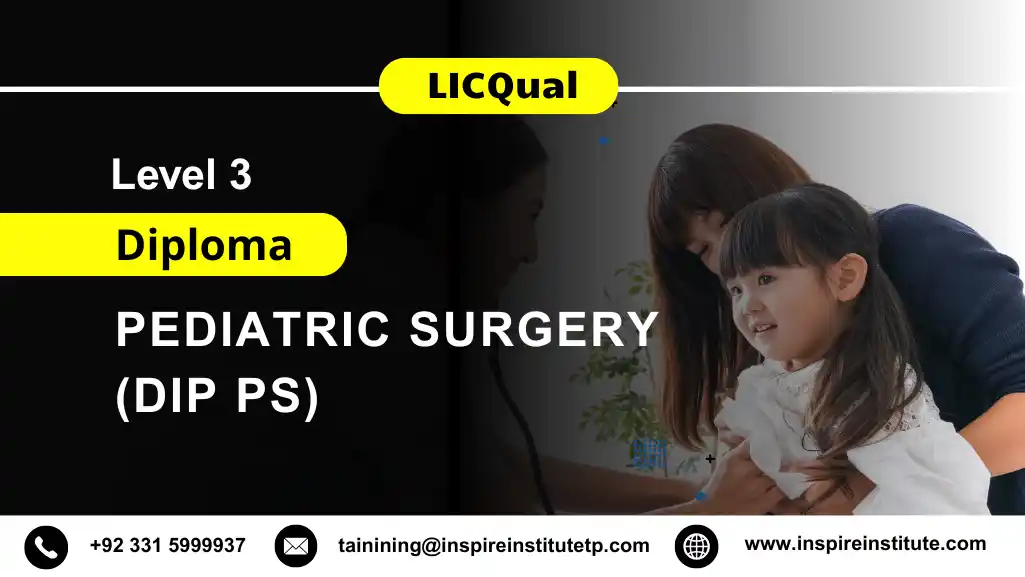LICQual Level 3 Diploma in Pediatric Surgery (Dip PS)
The LICQual Level 3 Diploma in Pediatric Surgery (Dip PS) provides an essential foundation for medical professionals seeking to advance their expertise in child-focused surgical care. With increasing global demand for skilled pediatric surgeons, this course equips learners with the knowledge and competencies required to perform and assist in pediatric surgical procedures safely and effectively. It is designed for healthcare practitioners aiming to enhance their clinical capabilities and deliver high-quality care to young patients.
This diploma course offers a comprehensive curriculum covering the fundamental principles of pediatric surgery. Learners will explore anatomy, physiology, surgical techniques, post-operative care, and patient safety protocols. The program emphasizes both theoretical understanding and practical application, ensuring students develop a well-rounded perspective on pediatric surgical practices. By focusing on real-world clinical scenarios, the course prepares participants to make informed decisions in complex pediatric cases, enhancing patient outcomes and professional competence.
Through the LICQual Level 3 Diploma in Pediatric Surgery, learners will gain advanced surgical skills and medical knowledge tailored to pediatric patients. Key competencies include preoperative assessment, intraoperative management, postoperative care, and emergency intervention strategies. The course also addresses ethical considerations, child psychology, and communication skills critical for interacting with young patients and their families. These skills ensure that graduates are not only technically proficient but also empathetic and patient-centered in their approach.
Practical application is a core component of this diploma, providing learners with opportunities to observe and participate in pediatric surgical procedures under expert guidance. Case studies, simulations, and assignments enable participants to translate theoretical knowledge into hands-on experience. By integrating evidence-based practices and modern surgical techniques, the course ensures that learners are prepared to meet the evolving standards of pediatric healthcare. This experiential approach fosters confidence and competence, essential for any healthcare professional pursuing a career in pediatric surgery.
The LICQual Level 3 Diploma in Pediatric Surgery (Dip PS) is suitable for aspiring pediatric surgeons, medical practitioners, and healthcare professionals aiming to specialize in child surgery. It also benefits nurses and allied healthcare staff involved in pediatric care, equipping them with the knowledge to support surgical teams effectively. Completion of this course enhances career prospects, positioning graduates as skilled professionals in the competitive field of pediatric surgery.
Enrolling in this diploma not only advances professional development but also contributes to improved healthcare delivery for children. Learners will leave with a robust understanding of pediatric surgical principles, enhanced clinical skills, and the ability to implement best practices in various medical settings. With its rigorous curriculum, practical focus, and emphasis on patient-centered care, the LICQual Level 3 Diploma in Pediatric Surgery stands as a vital qualification for anyone committed to excellence in pediatric surgical practice.
Why Choose this Qualification
The LICQual Level 3 Diploma in Pediatric Surgery (Dip PS) is an internationally recognized program designed for individuals who aspire to specialize in pediatric surgical care. This qualification bridges academic excellence with real-world clinical application, preparing learners to manage surgical interventions for infants, children, and adolescents with skill and confidence. It provides the essential theoretical understanding and practical exposure needed to thrive in pediatric healthcare environments while meeting international standards in surgical education.
Key Reasons to Choose This Qualification
1. Comprehensive Understanding of Pediatric Surgical Principles
• Gain a detailed understanding of child anatomy, physiology, and developmental surgical processes.
• Learn advanced pediatric surgical techniques, including modern and minimally invasive methods.
• Develop expertise in preoperative evaluation and postoperative care for pediatric patients.
• Master the ability to identify, assess, and manage complex pediatric surgical conditions.
• Build a strong foundation in combining theoretical concepts with real-world pediatric cases.
2. Practical Training and Clinical Relevance
• Participate in simulated and real clinical training to apply surgical knowledge effectively.
• Gain hands-on experience in surgical settings under expert supervision.
• Learn to handle surgical instruments and maintain sterile environments efficiently.
• Develop readiness to respond to emergency pediatric surgical situations.
• Apply evidence-based methods in clinical decision-making to ensure patient safety.
3. Industry-Recognized Qualification
• Achieve a globally accredited certification awarded by LICQual (UK).
• Strengthen your professional credibility with an internationally accepted qualification.
• Enhance your employability in hospitals, clinics, and specialized pediatric centers worldwide.
• Meet the global competency requirements for advanced pediatric surgical practice.
• Showcase your professional commitment to continuous growth in healthcare.
4. Advanced Clinical and Communication Skills
• Improve communication abilities for interacting with children and their families compassionately.
• Learn to convey complex surgical information clearly and sensitively.
• Build teamwork and collaboration skills within multidisciplinary healthcare teams.
• Strengthen leadership qualities necessary for managing pediatric surgical operations.
• Enhance your decision-making and problem-solving skills in critical clinical scenarios.
5. Ethical, Safe, and Evidence-Based Practice
• Understand ethical standards and patient rights in pediatric surgery.
• Learn to maintain child-centered care while adhering to global safety protocols.
• Apply evidence-based surgical practices to ensure high-quality outcomes.
• Embrace professional integrity and confidentiality in every clinical situation.
• Promote compassionate care and uphold medical ethics in pediatric healthcare.
6. Career Advancement Opportunities
• Gain access to higher-level qualifications and specialized pediatric surgical roles.
• Increase your potential for leadership and consultant positions in medical institutions.
• Enhance your professional profile to compete in the global healthcare job market.
• Build a solid foundation for involvement in pediatric surgical research and development.
• Advance toward becoming a trusted expert in pediatric surgical practice.
7. Flexible, Assignment-Based Learning Approach
• Enjoy a flexible study design that suits working professionals and students alike.
• Complete assignments based on practical applications and clinical problem-solving.
• Access interactive learning materials and dedicated academic support.
• Progress at your own pace while maintaining professional commitments.
• Benefit from an outcome-oriented learning process designed for maximum retention.
8. Contribution to Global Child Health Standards
• Become part of a professional network improving pediatric healthcare systems globally.
• Gain knowledge that contributes to the development of safer and more effective child surgery practices.
• Learn to apply international pediatric healthcare protocols within local contexts.
• Help promote sustainable improvements in global child health and safety standards.
• Play an active role in supporting future innovations in pediatric surgical education.
Choosing the LICQual Level 3 Diploma in Pediatric Surgery (Dip PS) means investing in a future built on knowledge, competence, and compassion. This qualification not only enhances your technical and clinical abilities but also positions you as a professional capable of making meaningful contributions to child healthcare worldwide. With its focus on academic rigor, practical training, and ethical excellence, this diploma empowers learners to stand out as skilled and responsible pediatric surgical practitioners.bal travel health initiatives.to global health outcomes in endocrinology.
Course Overview
LICQual UK Awarding Body
Average Completion Time:
4-12 Months
Study Units: 6 Units
Evidence & Assignment Based
Mandatory Units
Who Should Take This Course
The LICQual Level 3 Diploma in Pediatric Surgery (Dip PS) is designed for individuals who are passionate about improving child healthcare and aspire to build a strong professional foundation in pediatric surgery. This qualification is ideal for those seeking to expand their medical knowledge, develop specialized surgical skills, and advance their careers in pediatric healthcare environments. The course focuses on preparing learners with both academic understanding and practical expertise to ensure safe, ethical, and effective surgical care for infants, children, and adolescents.
This Course is Suitable For
1. Aspiring Pediatric Surgeons
• Ideal for medical professionals aiming to specialize in pediatric surgical practice.
• Learn the fundamental principles and procedures specific to child-focused surgery.
• Build essential preoperative, intraoperative, and postoperative management skills.
• Develop clinical judgment required for handling complex pediatric surgical cases.
• Gain recognized certification that strengthens eligibility for advanced surgical training.
2. General Practitioners and Medical Officers
• Enhance understanding of pediatric surgical interventions relevant to general practice.
• Learn to identify surgical conditions in children requiring specialist referral.
• Acquire foundational surgical knowledge to support early-stage clinical decision-making.
• Develop improved patient management and communication skills with families.
• Strengthen your professional competence in delivering integrated pediatric healthcare.
3. Pediatric Nurses and Nursing Supervisors
• Learn specialized nursing care principles related to pediatric surgical patients.
• Develop pre- and post-surgery care management strategies for young patients.
• Gain competence in infection control, wound care, and pain management.
• Understand surgical terminology and assist effectively during procedures.
• Improve patient safety and support the surgical team in clinical environments.
4. Surgical Technologists and Operating Room Assistants
• Enhance technical skills needed to assist in pediatric surgical operations.
• Learn surgical instrument handling and sterilization procedures.
• Develop awareness of pediatric anesthesia and surgical preparation standards.
• Improve coordination and precision in assisting surgeons during operations.
• Gain exposure to pediatric emergency response and critical care procedures.
5. Healthcare Administrators and Coordinators
• Understand the organizational and operational aspects of pediatric surgery units.
• Learn how to support clinical teams in resource allocation and patient management.
• Gain insight into healthcare quality assurance and child safety compliance.
• Strengthen knowledge of medical documentation and patient record systems.
• Develop the ability to enhance clinical efficiency through effective management.
6. Paramedics and Emergency Medical Technicians (EMTs)
• Learn to manage pediatric trauma and emergency surgical situations.
• Gain confidence in stabilizing young patients before surgical intervention.
• Understand pediatric airway management, fluid therapy, and first-aid techniques.
• Develop the ability to coordinate with hospital teams for emergency transfers.
• Acquire skills essential for responding to child surgical emergencies in field settings.
7. Medical Students and Interns
• Build a strong academic foundation in pediatric anatomy and surgical science.
• Gain exposure to real-world pediatric surgical practices and case studies.
• Learn through guided research, assignments, and applied assessments.
• Develop analytical skills for interpreting pediatric surgical data and outcomes.
• Prepare for future specialization and postgraduate medical training.
8. International Healthcare Professionals
• Suitable for professionals seeking a UK-recognized qualification in pediatric surgery.
• Gain cross-cultural competence in pediatric care aligned with international standards.
• Enhance employability in global healthcare institutions and NGOs.
• Learn global pediatric surgical protocols and healthcare ethics.
• Strengthen your credentials for migration, licensing, or professional advancement abroad.
The LICQual Level 3 Diploma in Pediatric Surgery (Dip PS) is an excellent choice for those who wish to advance in healthcare through a structured and assignment-based learning experience. By joining this program, learners not only gain professional expertise but also contribute to the global mission of improving surgical care for children. This course empowers individuals across diverse medical fields to elevate their knowledge, refine their skills, and make a meaningful impact in pediatric healthcare worldwide.onal credibility, and contribute to improved patient outcomes in endocrinology and metabolic medicine.
Course Benefits
The LICQual Level 3 Diploma in Pediatric Surgery (Dip PS) offers extensive benefits for learners aiming to build specialised expertise in pediatric surgical care, child health management, and clinical excellence. By integrating strong theoretical foundations with evidence-based practical applications, this UK-accredited qualification equips learners to assess, manage, and assist in pediatric surgical procedures effectively and ethically. Designed as an assignment-based programme, it provides flexibility, academic excellence, and professional relevance, supporting development for healthcare practitioners, nurses, medical assistants, and aspiring specialists in pediatric surgery.
Key Benefits of the Course:
- Specialist Knowledge:
Gain a comprehensive understanding of pediatric anatomy, surgical principles, and child-specific healthcare protocols. Learners explore surgical techniques, preoperative and postoperative management, anesthesia care for children, and the handling of pediatric emergencies. This knowledge enables graduates to make informed, evidence-based decisions and provide high-quality surgical support and care for infants and children. - Practical Application:
Develop essential clinical and surgical support skills in patient assessment, surgical preparation, and recovery care. Learners gain practical competence in assisting pediatric surgeons, maintaining sterile fields, monitoring vital signs, and supporting young patients throughout their surgical journey. The course ensures graduates can effectively apply their expertise in hospitals, clinics, and specialized pediatric healthcare environments. - Recognised Qualification:
Earn a UK-recognised diploma validating advanced knowledge and practical skills in pediatric surgery. This internationally respected qualification enhances professional credibility and career prospects, aligning with global healthcare standards. Graduates can pursue employment in hospitals, surgical units, pediatric clinics, and international healthcare organisations. - Flexible Learning Pathway:
Delivered through an assignment-based format, the programme allows learners to balance professional or personal responsibilities while advancing academically. This flexibility suits nurses, healthcare assistants, surgical technologists, and medical professionals seeking structured yet accessible training in pediatric surgical care and management. - Evidence-Based Training:
The course integrates current clinical research, surgical guidelines, and international best practices in pediatric surgery. Learners engage with evidence-based approaches to surgical procedures, infection control, anesthesia safety, and postoperative care, ensuring graduates adopt safe, effective, and ethical healthcare practices. - Career Development:
This qualification opens diverse career opportunities in pediatric hospitals, surgical departments, and healthcare institutions. Graduates can pursue roles such as pediatric surgical assistant, operating room technician, healthcare coordinator, or advance to higher studies in surgery, nursing, or pediatric healthcare specialisations. - Enhanced Patient Care Delivery:
Learners develop expertise to deliver patient-centred surgical care tailored to children, including preoperative preparation, surgical assistance, and postoperative monitoring. Graduates are equipped to improve patient safety, enhance surgical outcomes, and contribute to the overall quality of pediatric healthcare services. - Professional Growth:
The programme strengthens clinical reasoning, communication, and teamwork skills essential for effective pediatric surgical care. Learners cultivate professionalism, ethical awareness, and critical thinking, preparing them to become confident, competent, and compassionate healthcare practitioners in pediatric surgical environments.
The LICQual Level 3 Diploma in Pediatric Surgery (Dip PS) empowers learners with the knowledge, practical skills, and UK-recognised qualification needed to excel in pediatric healthcare. By combining rigorous academic learning with real-world clinical applications, it prepares healthcare professionals and aspiring practitioners to enhance child health, advance their careers, and contribute to the improvement of global pediatric healthcare standards.
Eligibility Criteria
The LICQual Level 3 Diploma in Pediatric Surgery (Dip PS) is a UK-accredited qualification specifically designed for healthcare professionals, nurses, surgical assistants, and individuals seeking to specialise in pediatric surgical care and child health management. This assignment-based programme provides a comprehensive understanding of pediatric anatomy, surgical procedures, preoperative and postoperative care, and emergency management in child surgery. By combining theoretical learning with hands-on clinical applications, the course equips learners with the essential skills and knowledge to support pediatric surgical teams effectively and ensure the highest standards of child healthcare. Learners who meet the entry requirements will be well-prepared to apply their expertise in hospitals, pediatric units, surgical departments, and healthcare organisations worldwide.
Educational Background:
Applicants should hold a recognised qualification in healthcare, nursing, medical sciences, or a related discipline. Candidates with Level 2 or Level 3 qualifications in healthcare practice, biology, anatomy, or clinical sciences are encouraged to apply. Individuals with equivalent international qualifications will also be considered, provided their credentials meet the academic and professional standards of the programme. This diploma is particularly suitable for learners with an educational background in health sciences, nursing, or allied healthcare who wish to deepen their understanding and competence in pediatric surgery, surgical assistance, and child healthcare management.
Professional Experience:
Previous professional experience in healthcare, surgical practice, or nursing is advantageous but not mandatory. A minimum of one year’s experience in healthcare or a related field—such as nursing, caregiving, or surgical assistance—is recommended. Applicants who have worked in hospitals, surgical units, or pediatric wards will find this qualification especially beneficial. However, individuals without prior experience but with a strong interest in pediatric surgery are also encouraged to apply, as the course provides thorough foundational and practical training to develop competence in this specialised field.
Age Requirement:
Learners must be at least 18 years old at the time of enrolment. This ensures that learners possess the maturity, discipline, and professional responsibility required for studying pediatric surgery, which involves complex medical concepts, ethical responsibilities, and hands-on surgical support. The programme requires dedication, critical thinking, and clinical awareness aligned with professional healthcare and surgical standards, making it appropriate for adult learners pursuing academic and career advancement in pediatric healthcare.
Language Proficiency:
As the LICQual Level 3 Diploma in Pediatric Surgery (Dip PS) is delivered and assessed in English, learners must demonstrate strong proficiency in reading, writing, and communication. Non-native English speakers are expected to hold an IELTS score of at least 6.0 or an equivalent qualification. This ensures that learners can effectively engage with technical course materials, understand clinical terminology, complete assignments, and communicate professionally within healthcare settings. Strong English proficiency also supports accurate patient documentation and contributes to the safe and ethical delivery of pediatric surgical care.
Technical Requirements:
Applicants should have access to a personal computer or laptop with a stable internet connection to participate fully in the online learning process. Basic IT literacy is essential, including familiarity with word processing, digital research, and online learning tools. Since the qualification is assignment-based, learners will submit coursework electronically and access learning resources through digital platforms. The flexible online format enables students to balance their studies alongside professional and personal commitments, making it ideal for healthcare workers seeking career development in pediatric surgery.
Required Documents:
To complete the registration process, applicants must provide a valid passport or national identification card for identity verification, along with proof of educational qualifications such as certificates or academic transcripts. Evidence of relevant professional or healthcare experience should also be submitted where applicable. International learners may be required to provide certified translations of academic or professional documents to verify authenticity and eligibility. These documentation requirements ensure that all applicants meet the academic, linguistic, and professional criteria necessary for successful admission into the LICQual Level 3 Diploma in Pediatric Surgery (Dip PS) programme.
The Qualification Process
LICQual Level 3 Diploma in Pediatric Surgery (Dip PS) follows a structured pathway to ensure learners gain comprehensive knowledge, practical skills, and professional competence in community oral healthcare.
Step 1: Self-Assessment
Learners review the entry requirements to confirm eligibility. Candidates with a background in dentistry, oral health, or public health are encouraged to apply.
Step 2: Registration
Complete the registration process by submitting required documents such as proof of qualifications, a valid ID, and payment of enrollment fees.
Step 3: Induction
An induction session is conducted to:
- Verify learner eligibility and documentation.
- Introduce study materials, learning outcomes, and assessment procedures.
Step 4: Learning and Evidence Submission
Learners complete assignments, case studies, and practical exercises demonstrating competence in public health dentistry, community oral health assessment, preventive strategies, and program planning.
Step 5: Feedback and Revision
Assessors review submitted evidence and provide constructive feedback. Learners can revise and resubmit work to meet all required standards.
Step 6: Competence Validation
Final submissions are evaluated to confirm that learners have met all theoretical and practical learning outcomes.
Step 7: Internal Quality Assurance (IQA)
The IQA team reviews the assessment process to ensure accuracy, fairness, and compliance with international standards.
Step 8: External Verification (EQA)
External verifiers validate the authenticity and quality of learner achievements.
Step 9: Certification
Upon successful verification, learners are awarded LICQual Level 3 Diploma in Pediatric Surgery (Dip PS) , demonstrating advanced proficiency in community oral healthcare and preparing them for professional growth in dental public health, preventive dentistry, and healthcare policy.







